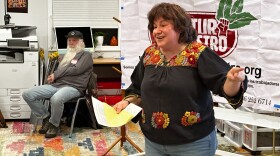The first thing you might notice walking into the kitchen of Charlotte’s Holy Trinity Greek Orthodox Cathedral are the hundreds and hundreds of little cups of tzatziki sauce.
Two women in aprons scoop the sauce from 32-pound buckets into the serving cups. They’ve been scooping all afternoon, and plan to keep going until they run out of tzatziki, one says.
Across the kitchen, two women use industrial meat slicers to fill a huge metal tray with roast lamb.
This weekend, these lamb dinners and tzatziki cups will be served to thousands of people at this year’s Yiasou Greek Festival. The festival started as a church fundraiser in 1978, and now attracts nearly 45,000 people a year to Dilworth.
As you might guess, that means there’s a lot of food to prepare. There’s feta, tomatoes and lettuce to chop, pastries to package, 7,000 pounds of chicken to roast, and 620 trays of baklava to bake.
"This is kind of the calm before the storm," says Lucy Pappadakes, the church's choir director and a kitchen volunteer.
On Tuesday, she filled three 55-gallon drums with homemade syrup. On Wednesday, she packaged stuffed grape leaves. This weekend, she’ll bake spanakopita.
She heaves the lid off one barrel to reveal the sweet syrup inside.
"It’s a heavy simple syrup. We use it for many of our pastries. There’s no honey in it, but there’s water, sugar, lemon and cinnamon sticks," she says.
The barrel is nearly as tall as she is — a fact that makes her laugh when it's pointed out.
"Yeah, let’s just say that this year I used 3,000 pounds of sugar, just for syrup," she says.
A long history of Greek cooking
Like many people in the Greek Orthodox community, Pappadakes has direct ties back to Greece.
Her father moved to the U.S. as a teenager around 1910. He later returned to Greece where he met his wife — Pappadakes’ mother — and the couple moved to Saint Petersburg, Florida, in 1953.
Pappadakes was born six years later. Growing up, she remembers seeing both her parents spend time in the kitchen.
“My dad was actually in restaurants his whole life, so they had their dishes,” she says. “He had his stuff that he would make, and then she had her stuff that she would make. I actually didn’t have a chance to cook that much at home, because it was always the two of them.”
Volunteering with the festival has given her a chance to recreate some of the same food her parents made for her, such as diples — a fried pastry — and Greek-style chicken.
Sharing favorite dishes is a tradition
Many festival attendees feel a strong connection to the food. Some might look forward to a sweet, nutty bite of baklava, or the apricot jam-filled ergolavi.
“I had a coworker, she always came Friday morning to get her lamb dinner. That’s it, and I mean she had been living here longer than I had at the time,” Pappadakes says.
The Greek festival is primarily a celebration of Greek culture, but it’s also a testament to the church volunteers and workers who toil in the kitchen to make it happen.
It’s grown much larger since Pappadakes started as a volunteer in 2001, but over the last few years, she says it’s gotten harder to find volunteers — especially youth.
Instead, the church has been using more hired workers to make the annual Grecian feast happen.
“I hope that the next generation steps up when it’s time," Pappadakes says. "That’s the part that’s always in the back of my mind. I hope that we can keep doing it.”
But there’s little time to think about that now — with 45,000 hungry people on the way.
The Yiasou Greek Festival takes place Sept. 6-8 at Holy Trinity Greek Orthodox Cathedral, 600 East Blvd.







